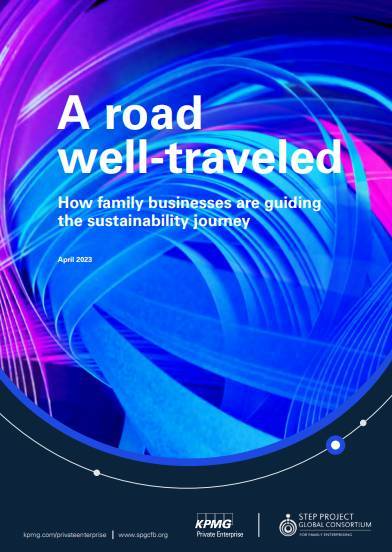Family Business Knowledge
2024 Global Family Business Survey and Report
The STEP Project Global Consortium (SPGC) in collaboration with KPMG Private Enterprise is setting out to gain a deeper understanding of the “essence” and impact of legacy in family businesses in a global research survey of family business leaders. GVSU and FOBI are STEP affiliates and we are supporting data collection in West Michigan. Share your views in this 15-minute survey which should be completed by the senior family leader in the family business.

STEP Project for Family Enterprising
FOBI is a member of the STEP Project for Family Enterprising, a global leading research network that conducts cutting-edge research about business families, through which successful best practices are uncovered, as well as the entrepreneurial challenges facing family business leaders.
The 2023 Step Project Global Consortium - SPGC American Family Business Report
The 2023 STEP Project Global Consortium - SPGC American Family Business Report has launched! At FOBI, we're very excited to share it with the family business community of West Michigan, that supported data collection. It contains information on how family businesses are guiding the sustainability journey.

Global Impact
A majority of the world’s wealth is created by family owned businesses.
Estimates suggest that businesses that are majority owned by a single family’s members contribute to 70-90 percent of the world’s GDP (Tharawat Magazine, Volume 22, p. 36)
New business is fueled by family involvement.
85 percent of start-ups worldwide are established with family money (FFI Global Data Points).
Family firms outperform nonfamily firms – universally.
The outperformance of family firms globally is demonstrated by a 6.65 percent difference in return on assets in the U.S., and at least an 8 percent difference in Europe and Chile (Poza 2012, p. 3).

United States
There are 5.5 million family businesses in the United States. Family owned businesses contribute 57% of the GDP and employ 63% of the workforce (Family Enterprise USA, 2011). That means family owned businesses employ over 98 million people! In addition, family businesses are responsible for 78% of all new job creation (Astrachan and Schanker, (2003) Family Business Review 16(3) 211-219).
Family firms boast distinct, competitive values that result in more than just profits. According to Family Enterprise USA, over 90 percent of family businesses feel that what sets them apart from non-family firms is a long-term investment philosophy, commitment to employees and suppliers and contributions to their communities.

West Michigan
Grand Rapids Michigan continues to rank highly on measures of community satisfaction. The city has been ranked as a top place to live (Relocate America, 2011), raise a family (Forbes, 2014) and retire (AARP, 2013). The contributions family businesses make to our community may be one of the variables why our community is so strong.
Many family businesses struggle to survive into future generations. In the literature, 30% of family businesses fail to survive the transfer from the first to second generation (Poza and Daugherty, 2014). Yet in FOBI's 2014 survey (drawn from our database of 690 family businesses in West Michigan), the average age of the family businesses in our survey were 50 years old and 11% were over 100 years old. In addition to providing stable long term jobs in West Michigan, family businesses engage in important philanthropy in our community. The 2014 FOBI survey found that 90% of family businesses engage in philanthropic giving.
Our 2014 survey also found that family businesses function differently during an economic downturn. When faced with reduced earnings, 76% of family business owners would reduce or not take a distribution and 58% would reduce or not take a salary. Layoffs were the last course of action they would take after reducing advertising and R&D expenditures. While family businesses have been criticized as being risk averse, because they have less debt and have non economic goals (i.e. values not based solely on profit) they can function differently during a downturn. FOBI has labeled this phenomenon the "flat spline economic theory of family businesses". We are conducting an economic and philanthropic impact study in West Michigan in the fall of 2015.

Photo of Downtown Grand Rapids
Challenges of the Family Firm
Lack of succession planning continues to threaten the longevity of many Michigan family owned businesses.
Eighty percent of family businesses surveyed in West Michigan stated that they intend for the business to be passed on to the succeeding generation. Still, only 19 percent report that they have begun planning for succession (FOBI 2014).
Family businesses must also balance the needs of the business and the family. A recent study conducted by Kennesaw State University and Ernst & Young (Hall and Astrachan, 2014) found that the largest and longest lasting family businesses globally became and remain successful by optimizing both family cohesion and profitable business growth.

